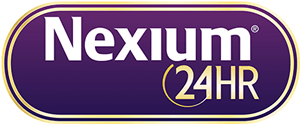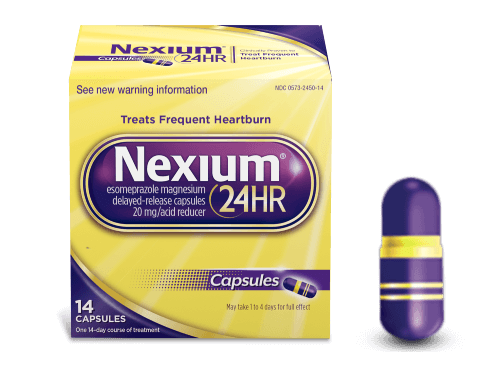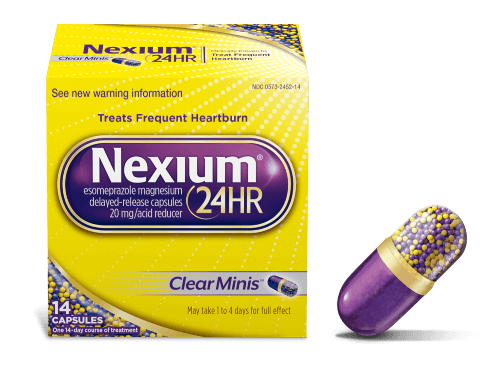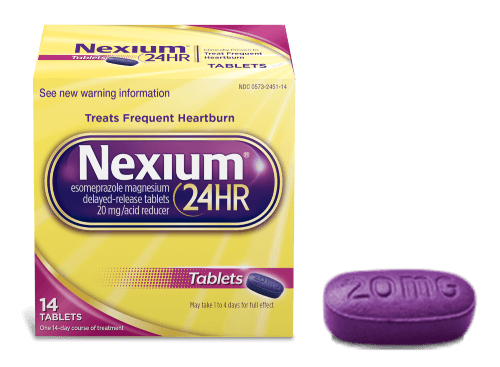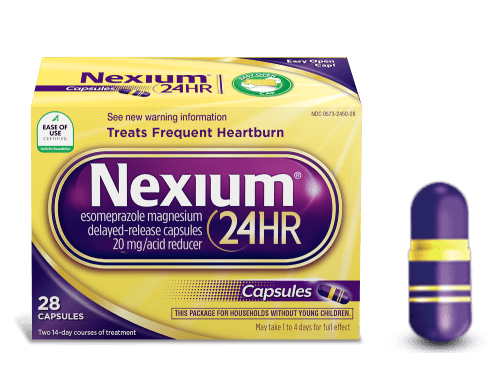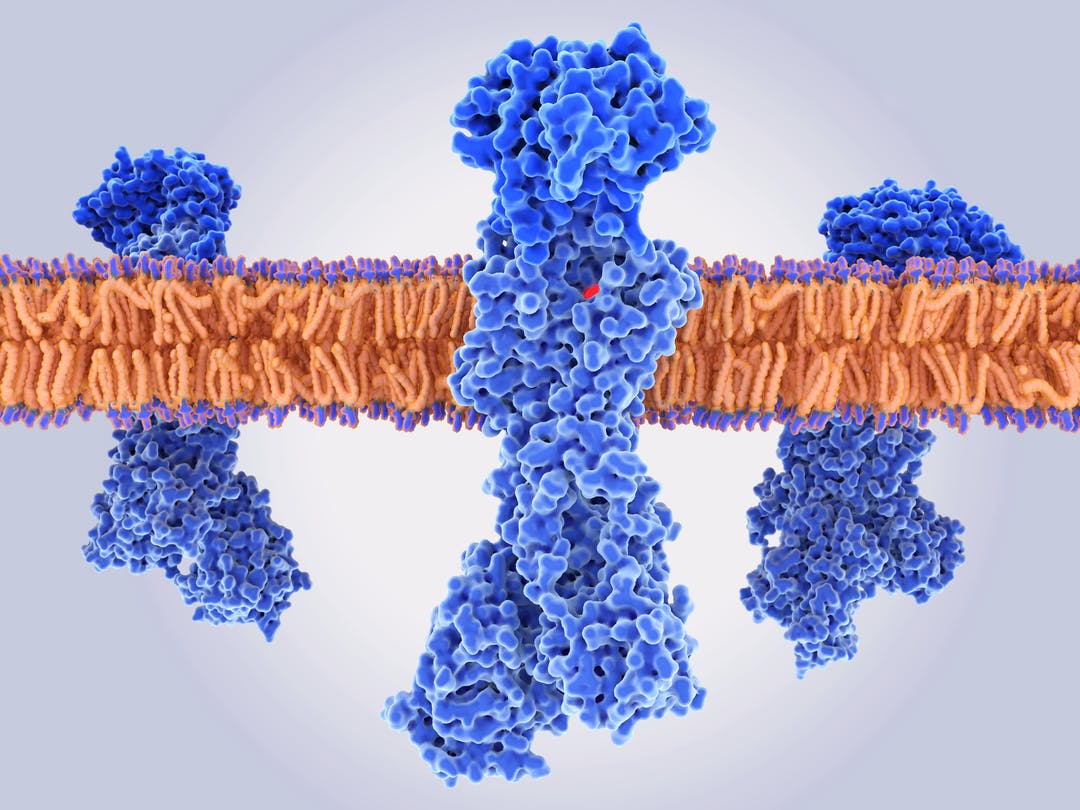Are you seeking over the counter medications (OTC) for heartburn relief? Depending on the frequency of your symptoms, your medical provider may recommend proton pump inhibitors (PPIs) or H2 blockers. Learn the difference between PPIs and H2 blockers and how they may help alleviate heartburn symptoms.
What are proton pump inhibitors and how do they work?
Proton pump inhibitors (PPIs) are a class of medications that are well-known and commonly used to manage stomach acid.5 They’re available over-the-counter or with a prescription, depending on the brand. Common conditions that are helped by these medicines include esophagitis, peptic ulcers, frequent heartburn and GERD.5
PPIs like Nexium24HR function to decrease the secretion of stomach acid; they do by blocking an enzyme from completing the chemical processes needed to create stomach acid.5 They don’t stop the production of stomach acid altogether, but they do cause your body to make less of it.5
PPIs are available over the counter as coated tablets, gelatin capsules, coated granules in a liquid suspension and in combination with bicarbonate.5 Nexium 24HR is available in capsules, tablets, and mini-capsules.
PPIs are more effective when taken over time to combat persistent heartburn symptoms. PPIs may take a few days for their full effect on acid secretion.5 They are most effective when taken in the morning before any food has been consumed, as the proton pump enzymes in the stomach become activated when there’s something to digest.5
There are also potential concerns and risks raised from PPI usage, including:
- Fracture Risk: Some research shows that PPIs may reduce the absorption of calcium, leading to weaker bones that are more susceptible of a fracture.6 However, the data connecting PPIs and osteoporosis is inconsistent and more research must be done.5
- Infection: Stomach acid creates an unwelcoming environment for bacteria; when acid levels are reduced by PPIs, some bacteria can survive and bacteria counts and foodborne infections can go up.5 If you have GERD and are taking PPIs, there is a possibility that bacteria in the stomach can travel up the esophagus and get inhaled into the lungs, potentially causing pneumonia.6
How do H2 blockers reduce stomach acid?
Histamine H2-recepter antagonists, commonly known as H2 blockers, help alleviate and prevent heartburn, acid indigestion, and sour stomach.1 After you eat, the hormone gastrin promotes the release of a signaling chemical called histamine (H2) within the stomach. Histamine binds to the appropriately named histamine (H2) receptors in the stomach which signals them to produce acid. H2 blockers temporarily bind to histamine receptors in the stomach instead, impeding the histamine and its message to make acid within the stomach.2
H2 blockers are offered as OTC medications, and available as capsules, chewable tablets, or oral solutions.2 It is recommended to consume a once-daily dose of an H2 receptor antagonist before bedtime, but individuals may choose to take it 30-60 minutes before consuming an identified trigger food or drink.2 Given their quick effectiveness, H2 blockers are good for alleviating symptoms as they occur. H2 blockers may have mild side effects, including the following:2
- Headache
- Drowsiness
- Fatigue
- Abdominal Pain
- Constipation
- Diarrhea
Elderly patients are often more sensitive to H2 blocker effects and are more likely to experience side effects.4 Additionally, consistent use of H2 blockers may create a tolerance, lowering its efficacy in treating gastroesophageal reflux disease (GERD) and heart burn symptoms.2 H2 blockers also have various drug interactions, so it’s important to consult with your medical provider, if you are currently taking any medication.4
Are H2 blockers or PPIs more effective?
PPIs are the most potent OTC medications available for inhibiting the production of stomach acid.6 H2 blockers provide protection against one source of acid, histamine8, whereas PPIs shield against all three sources (histamine, gastrin, and acetylcholine). The superior efficacy of PPIs is also evident in the duration of relief they offer; while H2 blockers offer relief for 4-10 hours2, PPIs such as Nexium24HR can provide 24 hours of relief. 9 And because of their effectiveness, PPIs are the most prescribed agent to reduce stomach acid.6
While both medications are effective at reducing acid secretion, their usage and potential risks are different. H2 blockers are commonly used at the onset of occasional symptoms; PPIs are approved by the FDA for managing frequent heartburn that occurs 2 or more days per week. In addition to potential side effects, both medications come with concerns and potential risks.7
One recent concern surfaced in 2020, with the Food and Drug Administration called for the immediate removal of medications containing the H2 blocker ranitidine from drugstore shelves.7 This was due to the detection of the cancer-causing chemical NDMA in several brand name and generic versions of the medication.7
As for PPIs, short term use of this OTC medication has been proven to be safe. However, long term PPI use, and lowered stomach secretion, can increase the risk for gastro-intestinal infections.7
Both products assist with reducing acid secretion – alleviating GERD, heartburn, and other symptoms. H2 blockers can offer swift relief, but are not as effective in the long-term as PPIs.
If you are seeking a treatment option for frequent heartburn relief, try Nexium24HR for long-lasting protection. Learn more about heartburn triggers and ways to alleviate your symptoms in the long run.
For more information around heartburn, check out Nexium 24HR on YouTube!
Source Citations:
- Histamine H2 Antagonist (Oral Route, Injection Route, Intravenous Route) - Description. Mayo Clinic. https://www.mayoclinic.org/drugs-supplements/histamine-h2-antagonist-oral-route-injection-route-intravenous-route/description/drg-20068584. Accessed 9/29/2023.
- H2 Blockers. Stat Pearls Publishing. https://www.ncbi.nlm.nih.gov/books/NBK525994/. Accessed 9/29/2023.
- Histamine H2 Antagonist (Oral Route, Injection Route, Intravenous Route) – Proper Use. Mayo Clinic. https://www.mayoclinic.org/drugs-supplements/histamine-h2-antagonist-oral-route-injection-route-intravenous-route/proper-use/drg-20068584. Accessed 9/29/2023.
- Histamine H2 Antagonist (Oral Route, Injection Route, Intravenous Route) – Before Using. Mayo Clinic. www.mayoclinic.org/drugs-supplements/histamine-h2-antagonist-oral-route-injection-route-intravenous-route/before-using/drg-20068584. Accessed 9/29/2023.
- Proton Pump Inhibitors (PPI). National Library of Medicine. https://www.ncbi.nlm.nih.gov/books/NBK557385. Accessed 1/18/23.
- Proton Pump Inhibitors: What you need to know. Harvard Health. https://www.health.harvard.edu/newsletter_article/proton-pump-inhibitors. Accessed 9/29/2023.
- Heartburn Medication Update. Harvard Health. https://www.health.harvard.edu/diseases-and-conditions/heartburn-medication-update. Accessed 9/29/2023.
- Advantages and Disadvantages of Long-term Proton Pump Inhibitor Use. https://www.ncbi.nlm.nih.gov/pmc/articles/PMC5885718/. Accessed 3/13/2024.
- Pharmacology of Proton Pump Inhibitors. https://www.ncbi.nlm.nih.gov/pmc/articles/PMC2855237/. Accessed 3/13/2024.
